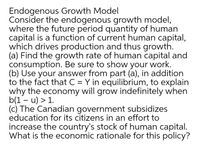Endogenous Growth Model Consider the endogenous growth model, where the future period quantity of human capital is a function of current human capital, which drives production and thus growth. (a) Find the growth rate of human capital and consumption. Be sure to show your work. (b) Use your answer from part (a), in addition to the fact that C = Y in equilibrium, to explain why the economy will grow indefinitely when b(1 – u) > 1. (c) The Canadian government subsidizes education for its citizens in an effort to increase the country's stock of human capital. What is the economic rationale for this policy?
Endogenous Growth Model Consider the endogenous growth model, where the future period quantity of human capital is a function of current human capital, which drives production and thus growth. (a) Find the growth rate of human capital and consumption. Be sure to show your work. (b) Use your answer from part (a), in addition to the fact that C = Y in equilibrium, to explain why the economy will grow indefinitely when b(1 – u) > 1. (c) The Canadian government subsidizes education for its citizens in an effort to increase the country's stock of human capital. What is the economic rationale for this policy?
Oh no! Our experts couldn't answer your question.
Don't worry! We won't leave you hanging. Plus, we're giving you back one question for the inconvenience.
Submit your question and receive a step-by-step explanation from our experts in as fast as 30 minutes.
You have no more questions left.
Message from our expert:
Hi and thanks for your question! Unfortunately we cannot answer this particular question due to its complexity.
We've credited a question back to your account. Apologies for the inconvenience.
Your Question:

Transcribed Image Text:Endogenous Growth Model
Consider the endogenous growth model,
where the future period quantity of human
capital is a function of current human capital,
which drives production and thus growth.
(a) Find the growth rate of human capital and
consumption. Be sure to show your work.
(b) Use your answer from part (a), in addition
to the fact that C = Y in equilibrium, to explain
why the economy will grow indefinitely when
b(1 – u) > 1.
(c) The Canadian government subsidizes
education for its citizens in an effort to
increase the country's stock of human capital.
What is the economic rationale for this policy?
Recommended textbooks for you

Principles of Economics 2e
Economics
ISBN:
9781947172364
Author:
Steven A. Greenlaw; David Shapiro
Publisher:
OpenStax

Principles of Economics 2e
Economics
ISBN:
9781947172364
Author:
Steven A. Greenlaw; David Shapiro
Publisher:
OpenStax
